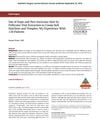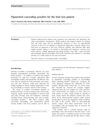 May 2017 in “InTech eBooks”
May 2017 in “InTech eBooks” Trichoscopy and trichogram are useful for diagnosing hair and scalp conditions.
 57 citations,
March 2019 in “Immunity”
57 citations,
March 2019 in “Immunity” The document concludes that the skin's immune system is complex, involving interactions with hair follicles, nerves, and microbes, and can protect or cause disease, offering targets for new treatments.
 37 citations,
August 2016 in “Clinical, Cosmetic and Investigational Dermatology”
37 citations,
August 2016 in “Clinical, Cosmetic and Investigational Dermatology” The document concludes that better treatments for CCCA are needed and more research is required to understand its causes related to hairstyling and genetics.
 January 2024 in “Molecules (Basel. Online)”
January 2024 in “Molecules (Basel. Online)” Juglone from walnut extracts may help repair damaged hair.
 March 2024 in “Nutrients”
March 2024 in “Nutrients” Gynostemma pentaphyllum and its component damulin B could help hair grow by activating certain cell pathways.
 January 2023 in “Operative Techniques in Otolaryngology-Head and Neck Surgery”
January 2023 in “Operative Techniques in Otolaryngology-Head and Neck Surgery” Hair transplants help transgender patients look more like their gender identity, with different procedures for trans women and men.
 7 citations,
February 2012 in “Facial Plastic Surgery”
7 citations,
February 2012 in “Facial Plastic Surgery” The mini-lift is a less invasive face-lift for younger patients that is quicker, cheaper, and has a fast recovery, but is less effective for the midface and excessive neck skin.
 August 2023 in “Military Medical Research”
August 2023 in “Military Medical Research” Scientists have improved 3D models of human skin for research and medical uses, but still face challenges in perfectly replicating real skin.
 9 citations,
January 2018 in “Hair transplant forum international”
9 citations,
January 2018 in “Hair transplant forum international” Researchers concluded that safe hair follicle extraction limits in FUE vary by individual characteristics and proposed a method to calculate these limits to maintain appearance.
January 2020 in “Indian Journal of Pharmaceutical Sciences” Natural products show promise for new hair loss treatments.
 13 citations,
July 2022 in “Frontiers in cell and developmental biology”
13 citations,
July 2022 in “Frontiers in cell and developmental biology” Tiny natural vesicles from cells might help treat hair loss.
 February 2020 in “Scholars international journal of traditional and complementary medicine”
February 2020 in “Scholars international journal of traditional and complementary medicine” Ayurveda treats hair problems like hair loss and dandruff by balancing body elements and using natural remedies like Indian Gooseberry and false Daisy.
 6 citations,
May 2022 in “Frontiers in Microbiology”
6 citations,
May 2022 in “Frontiers in Microbiology” Marine microbes could be used in cosmetics for sun protection, skin care, and possibly preventing hair loss.
 November 2024 in “Clinical Cosmetic and Investigational Dermatology”
November 2024 in “Clinical Cosmetic and Investigational Dermatology” Rosemary oil may effectively treat hair loss with fewer side effects, but more research is needed.

North American ginseng extract helped regrow hair in balding mice.
 50 citations,
December 1998 in “Dermatologic Surgery”
50 citations,
December 1998 in “Dermatologic Surgery” Hair loss is more common in men aged 18-49 and increases with age.
 March 2024 in “Asian journal of beauty & cosmetology”
March 2024 in “Asian journal of beauty & cosmetology” Derma Genie™-H001 can help prevent hair loss and promote hair growth.
 2 citations,
August 2020 in “International Journal of Cosmetic Science”
2 citations,
August 2020 in “International Journal of Cosmetic Science” Lindera strychnifolia root extract may help balance scalp bacteria and potentially reduce hair loss.
 July 2011 in “Springer eBooks”
July 2011 in “Springer eBooks” The document concluded that FDA-approved treatments like minoxidil and finasteride are effective for hair loss, while the effectiveness of natural remedies and other non-approved treatments is not well-supported by evidence.
 April 2014 in “Journal of Aesthetic Nursing”
April 2014 in “Journal of Aesthetic Nursing” Mesotherapy with natural extracts and vitamins can improve hair loss and promote regrowth in most women.
 January 2020 in “Veterinary world/Veterinary World”
January 2020 in “Veterinary world/Veterinary World” The natural topical treatment improved rabbits' skin and hair condition.
253 citations,
December 2007 in “Journal of Investigative Dermatology” Hair follicles prevent NK cell attacks to avoid hair loss.
 13 citations,
September 2015 in “Aesthetic Surgery Journal”
13 citations,
September 2015 in “Aesthetic Surgery Journal” Transplanting hair from the nape and around the ear to the hairline and temples generally satisfies patients and looks natural.
 3 citations,
June 2005 in “Ophthalmology Clinics of North America”
3 citations,
June 2005 in “Ophthalmology Clinics of North America” Follicular unit transplantation treats hair loss and restores eyebrows with short recovery and natural results.
 February 2024 in “Biomedical materials”
February 2024 in “Biomedical materials” Scientists created a lab-grown hair follicle model that behaves like real hair and could improve hair loss treatment research.

Four natural compounds were found to promote hair growth effectively.
 6 citations,
December 2013 in “Journal of Cosmetic Dermatology”
6 citations,
December 2013 in “Journal of Cosmetic Dermatology” Pigmented concealing powders can improve the look of hair density for people with hair loss but need daily application and may not work well in wet conditions.
11 citations,
March 2001 in “Clinics in dermatology” The new microneedle method delivers hair loss treatment more effectively by enhancing growth pathways.
 5 citations,
September 2012 in “Journal of Investigative Dermatology”
5 citations,
September 2012 in “Journal of Investigative Dermatology” Scientists can mimic hair disorders by altering genes in lab-grown human hair follicles, but these follicles lack some features of natural ones.
 49 citations,
October 2017 in “Nutrients”
49 citations,
October 2017 in “Nutrients” Equisetum debile extract, especially the ethyl acetate type, may be a promising natural ingredient for anti-hair loss products.



























